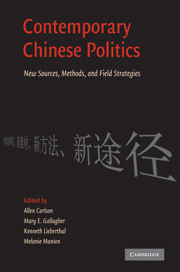Book contents
- Frontmatter
- Contents
- Tables and Figures
- Contributors
- Abbreviations
- Introduction
- Part I Sources
- 1 State-Generated Data and Contentious Politics in China
- 2 Why Archives?
- 3 The Central Committee, Past and Present
- 4 Experimental Methods and Psychological Measures in the Study of Chinese Foreign Policy
- 5 Internet Resources and the Study of Chinese Foreign Relations
- 6 Information Overload?
- Part II Qualitative Methods
- Part III Survey Methods
- Reflections on the Evolution of the China Field in Political Science
- Glossary
- References
- Index
5 - Internet Resources and the Study of Chinese Foreign Relations
Can Cyberspace Shed New Light on China’s Approach to the World?
Published online by Cambridge University Press: 05 June 2012
- Frontmatter
- Contents
- Tables and Figures
- Contributors
- Abbreviations
- Introduction
- Part I Sources
- 1 State-Generated Data and Contentious Politics in China
- 2 Why Archives?
- 3 The Central Committee, Past and Present
- 4 Experimental Methods and Psychological Measures in the Study of Chinese Foreign Policy
- 5 Internet Resources and the Study of Chinese Foreign Relations
- 6 Information Overload?
- Part II Qualitative Methods
- Part III Survey Methods
- Reflections on the Evolution of the China Field in Political Science
- Glossary
- References
- Index
Summary
For decades, students of Chinese foreign policy were confronted with a stark dearth of information relating to China’s position in the international arena. In the 1960s, Allen Whiting’s seminal work, China Crosses the Yalu, while drawing from the author’s extensive governmental experience, referenced only a limited pool of official Chinese sources to describe Beijing’s stance on the Korean peninsula. In the 1970s, the main source of information for Samuel Kim’s book, China, the United Nations and World Order, was Chinese votes in the United Nations General Assembly. A few years later, A. Doak Barnett’s short, but influential, The Making of Foreign Policy in China, was also marked by the use of a limited number of sources. In contrast, in the late 1980s, a new generation of scholars began to gain access to a somewhat broader set of data. The best examples of this trend were Tom Christensen’s consideration of newly available documents relating to the Korean War, followed by Iain Johnston, David Shambaugh, and Robert Ross’s utilization of extensive interview data. However, this being the case, the general informational frame for researching Chinese foreign policy has remained relatively static since the early 1990s, with researchers repeatedly making use of the same limited set of sources (a handful of Chinese-language journals dedicated to international politics, official statements, a smattering of 内部 documents, and interviews with a small circle of foreign policy elites). In comparison, it is widely perceived that the study of Chinese foreign policy is now poised to enter a new era. Indications of such an incipient development are purported to be found in the expanding availability of new data. The most prominent of these sources is generally seen to be the Chinese Internet, which appears to contain a treasure trove of new information related to China’s foreign relations. The question then becomes how significant is the Internet to the study of Chinese foreign policy?
- Type
- Chapter
- Information
- Contemporary Chinese PoliticsNew Sources, Methods, and Field Strategies, pp. 88 - 106Publisher: Cambridge University PressPrint publication year: 2010
- 3
- Cited by



